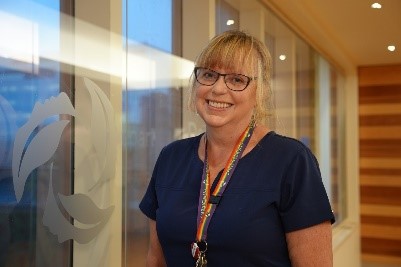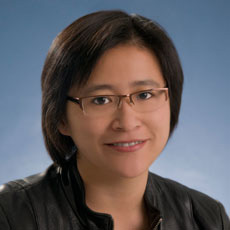Speakers

Dr. Jackie Bender PhD
Scientist, Department of Supportive Care, Princess Margaret Cancer Centre, University Health Network
Assistant Professor, Dalla Lana School of Public Health and Institute of Health, Policy and Management, University of Toronto
Dr. Jackie Bender is a Scientist and Co-Lead of Equity, Diversity and Inclusion in the Department of Supportive Care at the Princess Margaret Cancer Centre, and an Affiliate Scientist at the Princess Margaret Research Institute. She is also an Assistant Professor in the Dalla Lana School of Public Health and the Institute for Health Policy, Management and Evaluation at the University of Toronto. Dr. Bender has an innovative research program focused on designing, implementing, and evaluating digital health innovations that improve cancer care access, experience, and outcomes, and promote health equity. This includes an extensive research program in cancer navigation.

Patricia (Trish) Blinn OT Reg. (Ont.)
Occupational Therapist, Cancer Rehabilitation and Survivorship Program
Department of Supportive Care
Princess Margaret Cancer Centre, University Health Network
Patricia (Trish) Blinn is an occupational therapist at the Cancer Rehabilitation and Survivorship program at the Princess Margaret Cancer Centre in Toronto. In this role, Trish works with an interdisciplinary team to provide support for outpatients experiencing cancer treatment related side effects, with the goal of improving function and quality of life. She has been employed with UHN team for six years and involved in oncology rehabilitation and research for ten years.
Trish recently completed a UHN Collaborative Academic Practice (CAP) Quality Improvement Fellowship, with a focus on cellulitis management in lymphedema. This six-month fellowship provided support for Trish to lead a quality improvement project on cellulitis in her program, aimed at increasing clinician confidence in cellulitis management.
Trish is passionate about using clinical practice, education, research, and quality improvement initiatives to improve patient quality of life in individuals affected by cancer and to bridge gaps in oncology care.

Sarah Hales MD PhD
Psychiatrist, Department of Supportive Care, Princess Margaret Cancer Centre
Assistant Professor, Department of Psychiatry, University of Toronto
Dr. Hales is a psychiatrist in the Department of Supportive Care at the Princess Margaret Cancer Centre and Assistant Professor in the Department of Psychiatry at the University of Toronto. Her research has been funded by agencies including the Canadian Institutes of Health Research, the Canadian Cancer Society, and Prostate Cancer Canada/Movember. Her interests include the advanced cancer experience as it affects patients and families, and psychotherapeutic interventions aimed at alleviating their distress. Together with Dr. Gary Rodin she developed one of the first standardized frameworks for the psychotherapeutic care of those living with advanced cancer. They are co-authors of the 2021 book Managing Cancer and Living Meaningfully: An Evidence-Based Intervention for Cancer Patients and Their Caregivers. In collaboration with Drs. Emma Hapke and Dan Rosenbaum, she developed Psilocybin-assisted Existential Attachment and RelationaL (PEARL) therapy and trials are currently underway to study the impact of this novel intervention on those experiencing mortality-related distress.

Dr. Jennifer Jones PhD
Director, Cancer Rehabilitation and Survivorship Program, Department of Supportive Care
Butterfield/Drew Chair in Cancer Survivorship Research
Associate Professor, Department of Psychiatry Dalla Lana School of Public Health (cross-appointment), University of Toronto
Dr. Jennifer Jones is the Director of Research for the Cancer Survivorship Program, Associate Director of the Centre for Health Wellness and Cancer Survivorship (ELLICSR) and a Research Associate in the Department of Psychosocial Oncology and Palliative Care at Princess Margaret Hospital. In addition, she is an Assistant Professor in the Department of Psychiatry and the Della Lana School of Public Health, at University of Toronto.
Dr. Jones’ research program has primarily focused on psychosocial factors among the medically ill. This has included the assessment of symptoms and quality of life at the end of life and the use of proxy assessments. More recently, through her work within the Cancer Survivorship Program at Princess Margaret Hospital (PMH),her research interests have included: 1) assessing the prevalence and impact of long-term and late effects of cancer and its treatment (i.e. fatigue, bone loss) and psychosocial distress in cancer survivors; 2) the development and evaluation of group and individual psychoeducational interventions to promote patient engagement in self-management activities and to support families affected by cancer; 3) evaluation of new innovative models of care delivery. She has also developed expertise in the area of continuing education and professional development and knowledge translation.

Margo KennedyMSW, RSW
Princess Margaret Cancer Centre, Department of Supportive Care, University Health Network, Ontario. Clinical Lead for the PM Sexual and Gender Diversity in Cancer Care (SGDc) Program
Margo Kennedy (she/her) brings 32 years of experience to her role in clinical social work. She holds a Master in Social Work (MSW) from University of Toronto and is driven by her passion for health equity issues. Her extensive experience in cancer care has provided a deep appreciation for the many stresses, barriers and challenges that cancer patients may encounter, especially related to intersectional identities. She co-founded the Sexual and Gender Diversity in Cancer Care Program at Princess Margaret Cancer Centre, University Health Network in 2020 and is the Clinical Lead of this program which is now running it its fourth year. She has been presenting nationally and internationally on topics related to Sexual and Gender Diversity in Cancer Care. Margo loves helping people to find their strengths, pride and superpowers. Her interests include gardening, queer culture, coffee, and a life long quest to continue to learn and navigate challenges to improve patient care.

Dr. Jenny Lau, MSc MD CCFP (Palliative Medicine)
Medical Director, Harold and Shirley Lederman Palliative Care Centre (16P), Princess Margaret Cancer Centre, UHN Lecturer, Division of Palliative Care, Department of Family and Community Medicine, University of Toronto
Dr. Jenny Lau MD, CCFP (PC), MSc is the Medical Director of the Harold and Shirley Lederman Palliative Care Centre at Princess Margaret Cancer Center in Toronto. Dr. Lau completed her family medicine training at the University Ottawa followed by a certificate of added competence in palliative care at the University of Alberta and a Master of Science in medical science with collaborative specialization in addiction studies at the University of Toronto. She is a nationally funded clinician investigator who leads numerous projects focused on addressing opioid-related health harms and opioid use disorder in the context of life-threatening illnesses.

Dr. Madeline Li MD PhD FRCP (C)
Psychiatrist, Psychosocial Oncology, Department of Supportive Care
Dr. Madeline Li is a clinician-scientist in the Department of Supportive Care, Princess Margaret Cancer Centre. She completed a MD/PhD degree, with graduate studies in molecular genetics from the Department of Medical Biophysics, Ontario Cancer Institute, followed by a psychiatry residency at the University of Toronto and a fellowship in psychiatric oncology and psychoneuroimmunology at the Princess Margaret Cancer Centre.

Dr. Warren Lewin MD, CCFP (PC)
Assistant Professor, Department of Family & Community Medicine, Division of Palliative Care, University of Toronto
Warren Lewin is an assistant professor in the Dept. of Family and Community Medicine at the University of Toronto and is the Site Lead for the Palliative Care program at the Toronto Western Hospital. He completed his family medicine training at the University of Toronto and a palliative medicine fellowship at Harvard University. He lectures nationally and internationally on serious illness communication and is a senior faculty member with VitalTalk. He directs The Conversation Lab at UHN, which is a hub to study and teach communication as a means to empower clinicians and health systems to improve serious illness care.

Dr. Rinat Nissim, Ph.D., C. Psych.
Psychologist, Department of Supportive Care, Princess Margaret Cancer Centre
Dr. Nissim is a staff psychologist and the co-director of the Caregiver Clinic at the Department of Supportive Care of the Princess Margaret Cancer Centre, an assistant professor in the Department of Psychiatry, and an associate member of the Institute of Medical Science, University of Toronto. Her research program aligns with her clinical focus on the psychosocial needs of family caregivers of individuals with cancer, utilizing qualitative and mixed-method research approaches.

Dr. Gary Rodin MD FRCPC
Head, Department of Psychosocial Oncology and Palliative Care, Princess Margaret Hospital, University Health Network
Dr. Gary Rodin's research program is focused on the development, testing and global implementation of novel psychological and palliative interventions for patients with advanced cancer and their families. This includes a brief supportive-expressive intervention referred to as Managing Cancer and Living Meaningfully (CALM). We have shown in a large CIHR-funded randomized controlled trial that CALM alleviates depression, reduces death anxiety and improves communication with health care providers and preparation for the end of life in patients with metastatic or advanced cancer. Our Global CALM Program has partnered with more than fifteen countries to implement CALM internationally. We have also developed an integrated psychological and symptom control intervention for patients with acute leukemia, referred to as Emotion and Symptom-Focused Engagement (EASE). We showed in a randomized pilot study funded by the Canadian Cancer Society that EASE alleviates traumatic stress and physical symptoms, and we are now beginning a multicenter trial of EASE funded by the Cancer Clinical Trials Group of the Canadian Cancer Society and the CIHR.

Dr. Camilla ZimmermannMD, MPH, PhD, FRCPC
Head and Lederman Chair, Department of Supportive Care
Head, Division of Palliative Care, Department of Supportive Care
Professor of Medicine, University of Toronto
Dr. Camilla Zimmermann's research team is studying theoretical, empirical, and methodological aspects of measuring the effectiveness of specialized palliative care. This involves developing and testing potential models for the provision of palliative care, as well as validating existing measures of palliative care effectiveness and creating new ones. A particular focus is the early involvement of palliative care services in the outpatient setting. Funded by the Canadian Institutes of Health Research (CIHR), we have conducted trials of Symptom screening with Targeted Early Palliative care (STEP), versus usual care, in patients with advanced cancer and are planning a further trial of virtual STEP. Additionally, we are conducting a CIHR-funded multicentre mixed methods study using ICES data and qualitative interviews to examine the impact of COVID-19 on cancer care at the end of life. Funded by the Canadian Cancer Society and CIHR, we are also conducting a multicentre randomised trial of a joint psychological and physical symptom intervention to improve patient well-being and symptom control in patients with acute leukemia.
Event Date & Time
Thursday, May 9, 2024
8:00 am - 4:30 pm Eastern
Event Location
Virtual, Zoom
A link will be emailed to registrants prior to the event
Information & Assistance
Conference Services
conferences@uhn.ca


 Copyright© 2017 | MYConference Suite Registration | D.E. Systems | All Right Reserved.
Copyright© 2017 | MYConference Suite Registration | D.E. Systems | All Right Reserved.